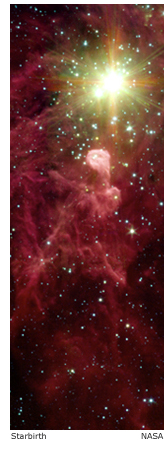Preliminary List of Topics:
Below is a list of topics that I have included in previous offerings of Ast 352K. The order of these
topics may be somewhat different from that shown below; it's also possible that some topics will be
omitted and other topics added. I plan to cover most of the topics below in my lectures. Other,
narrower topics, such as particular classes of stars, phases of their lives, etc., are particularly
appropriate for student presentations, and which ones are covered will depend on your choices.

- Positions of Stars on the Sky: celestial sphere, astronomical coordinate systems, precession
- Radiation: the electromagnetic spectrum, quantities of radiation (intensity, flux), blackbodies
- Photometric Properties of Stars: luminosity, magnitude scale, filter photometry, color index
- Effects of the Earth's Atmosphere: extinction, refraction, seeing, emission
- Telescopes & Techniques, astronomical instrumentation and detectors
- The Physics of Spectral Lines: Bohr atom, absorption and emission lines, Doppler shift
- Spectroscopic Properties of Stars: spectral types, Boltzmann and Saha equations
- The Hertzsprung-Russell Diagram: the key to understanding stellar evolution
- General Motions of Stars: proper motion and radial velocity, moving groups
- Orbital Motions of Stars: types of binary stars, derivation of stellar masses
- Basic Ideas of Stellar Structure and Evolution, empirical tests of the theory
- Stellar Ensembles: star clusters, stellar populations in the Milky Way Galaxy
Departmental Information:
In case you are not aware of the following resources, if you have questions or problems regarding
this class than cannot be resolved by the instructor or Teaching Assistant, you may consult other
departmental personnel with responsibility for student matters. The key people include:
Ms. Stephanie Crouch, Student Coordinator, RLM 15.202AA,
471-3350,
scrouch@astro.as.utexas.edu
Prof. Gregory Shields, Undergraduate Studies Chair,
471-1402, shields@astro.as.utexas.edu
Prof. Shardha Jogee, Undergraduate Majors Advisor,
471-1395, sj@astro.as.utexas.edu
Prof. Don Winget, Department Chair,
471-3302, chair@astro.as.utexas.edu
Finally, you should be aware of the Astronomy Weekly Calendar, which lists all seminars and
colloquia for the current or coming week, at https://www.as.utexas.edu/calendar. Our department
sponsors a lively set of talks on current research every week, in all areas of astronomy, delivered by
members of our community ranging from graduate students (and sometimes undergraduates),
postdoctoral fellows, faculty and research scientists, and visitors. As long as a seminar is listed on
the calendar, it is open to anyone. You should feel free to sit in on talks that look interesting to you.
Even if you only understand a small fraction of what is said, you'll have learned something! In
particular, keep an eye on the Stellar Seminar on Wednesdays from noon to 1 PM.
|

